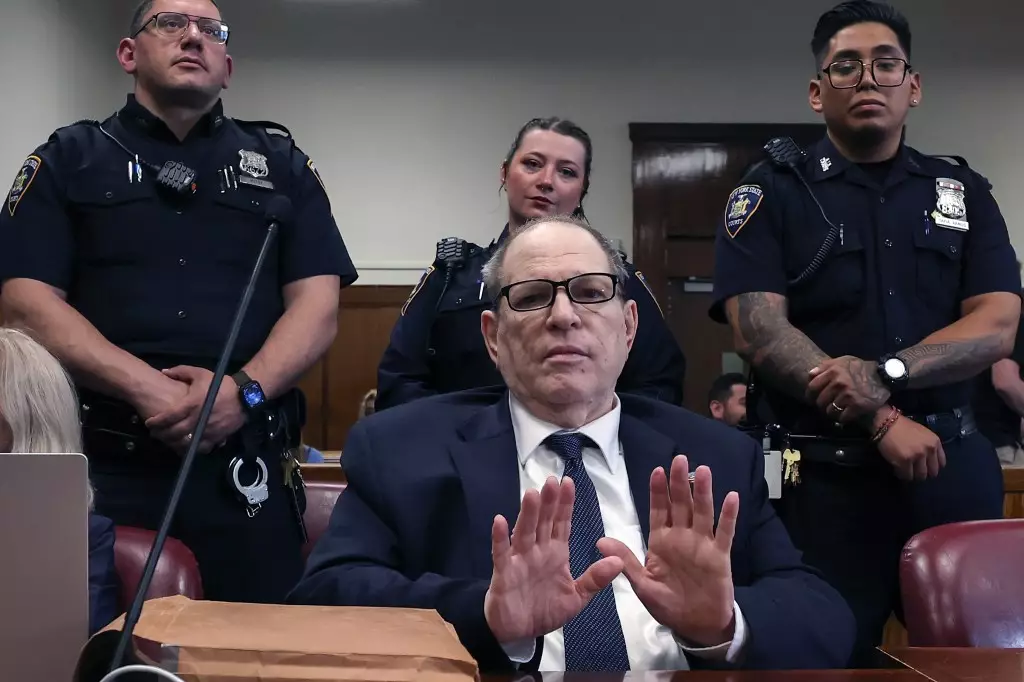Harvey Weinstein’s downfall is a stark reminder of the dark underbelly of Hollywood—a world that often masks its grotesque realities behind glitz and glamour. Now, as Weinstein’s retrial in New York unfolds, the very public process confronts not just the man himself, but also the systemic issues permeating the judicial and social frameworks surrounding sexual violence. As he sidesteps the witness stand, opting to keep his silence rather than face a jury that has been thousands of eyes scrutinizing him over decades of allegations, one cannot help but ponder the implications of his choice.
The influence of perception in the courtroom cannot be overstated; Weinstein, once a titan of the film industry, is now a pariah. His decision to remain silent speaks volumes about the tarnishing of his credibility, one that his seasoned legal team seems eager to protect, albeit through a lens of caution that edges toward evasion. In a world that has seen pervasive narratives shifting—including the recent surge of the #MeToo movement—logic dictates that angry sentiments could eclipse rational arguments, propelling a rush to judgment that could imperil true justice.
The Dance of Public Relations
While Weinstein may step away from open testimony, he has not retreated into complete obscurity. Instead, he has waged a perceptive public relations campaign from behind bars. Entering into discussions with controversial figures, such as Candace Owens, only complicates his narrative. His claims of wrongful accusation echo with a feigned innocence that many, especially in the #MeToo era, find hard to digest, and bring back the conversation about how manipulative PR tactics can serve as a smokescreen in the face of glaring allegations.
By continuing to assert that these interactions were mutual—a “friends with benefits” arrangement—Weinstein and his legal team are attempting to reshape the conversation surrounding consent, and thus, culpability. This not only distances him from allegations of rape but also seeks to discredit the voices of those who may have truly suffered. It evokes deep ethical questions about power dynamics and the often-ambiguous nature of consent in relationships steeped in inequity and predatory behavior.
The Legal Labyrinth
The courtroom proceedings expose a legal labyrinth fraught with potential pitfalls, both for Weinstein and those who accuse him. His history in the judicial system is marred by previous convictions that were overturned amid political maneuvering and controversial testimony. Indeed, with a new judge presiding over this case, the landscape feels as though it is tilting ever-so-slightly in favor of what might be seen as privilege—a privilege that has sheltered Weinstein for most of his career and, according to many, exacerbated the systemic failings we witness today.
While Weinstein’s pending trials hang in balance, it raises profound doubts about the integrity of a justice system that can seem more interested in media narratives and power plays than in the actual pursuit of truth. The complexities of his trials also reflect broader societal issues, such as the frequently blurred lines between morality and legality. The idea that justice should sift through the immoral to uncover what is criminal seems increasingly naive as the emotional weight of allegations against him continues to swell.
The Broader Healing Wound
This case transcends the specifics of Weinstein’s actions and pulls at the fragility of a culture that has long tolerated abuse, manipulation, and silencing. With his trial capturing national attention—drawing both fervent supporters and vehement critics—discourse on masculinity, power, and accountability intensifies. It forces society to reckon with not just the actions of one man, but with an entire industry’s implicit consent to an environment where predators thrived at the expense of trauma-laden victims.
In an era punctuated by a demand for accountability, the stakes are monumental. This trial is not merely a matter of a man facing consequences; it serves as a potential harbinger of change regarding expectations of power holders in various sectors. If justice can prevail here, perhaps it signifies a transformative shift—that both celebrity and influence do not shield one from the long-reaching arm of the law.
As the jury prepares to deliberate, the outcome will not only determine Weinstein’s fate, but also send ripples through the very fabric of societal norms that have allowed such injustice to linger far too long. The unyielding spotlight is on Hollywood, and it must reckon with whether it can emerge from the shadows of its own complicity.


Leave a Reply